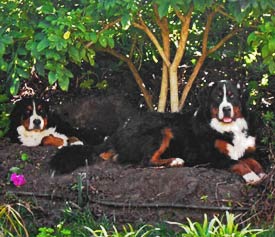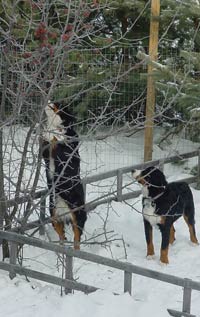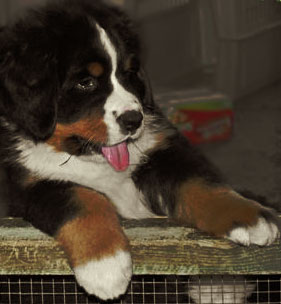Fencing - its about responsible owner management of Bernese
 When weather permits, Berners benefit from spending several hours a day
outside in the fresh air - a fenced yard can be a perfect place for Berners
to rest or play and experience the stimulating sights and sounds of nature.
Many breeders prefer to place pups in homes with a fenced yard. There
are some breeders who will not consider selling a Berner puppy to a buyer
who can not provide secure outdoor accommodations for their dog. Breeders who require fencing as a condition for placement of Berner pups
realize owners who don't have fenced yards may not be aware of how much
time and effort it takes to diligently monitor a Berner in an outdoor situation. The main reason
breeders are more comfortable selling their Berner pups to an owner who
offers a fenced yard is - owners too often fail to strictly monitor dogs when they are outside which can put dogs and people at a greater risk
for accidents or injury.
When weather permits, Berners benefit from spending several hours a day
outside in the fresh air - a fenced yard can be a perfect place for Berners
to rest or play and experience the stimulating sights and sounds of nature.
Many breeders prefer to place pups in homes with a fenced yard. There
are some breeders who will not consider selling a Berner puppy to a buyer
who can not provide secure outdoor accommodations for their dog. Breeders who require fencing as a condition for placement of Berner pups
realize owners who don't have fenced yards may not be aware of how much
time and effort it takes to diligently monitor a Berner in an outdoor situation. The main reason
breeders are more comfortable selling their Berner pups to an owner who
offers a fenced yard is - owners too often fail to strictly monitor dogs when they are outside which can put dogs and people at a greater risk
for accidents or injury.
No Fencing management - Consider the following...
⇒ Without a fence and strict supervision, would your dog 'stick around' if let outside to relieve itself?
⇒ Can you be 100% certain your dog will come to you when called under any circumstances?
⇒ Might you be distracted by a phone call or interrupted by children who required your attention while monitoring your unfenced dog?
⇒ Could you safely say your dog would stay on your property if the dog saw a cat or a person across the street?
⇒ Are you aware that your Berner will use its nose to find wildlife, the neighbor's barbeque grill, garbage cans, or another dog.
⇒ It is likely others will have occasion to monitor your unfenced dog outside; the babysitter or a child may not be attentive and astute enough to watch or control the dog.
⇒ Would your Berner, if excited or scared, charge through an outside door in your home into an unfenced yard and just keep going?
⇒ Would you consider someone else's large black dog roaming in your neighborhood as potentially dangerous to itself and to people? A roaming dog is a traffic hazard.
⇒ Are you aware intact (not neutered or spayed) male and female dogs can have strong instincts to reproduce. Countless numbers of puppies have been born as a result of unplanned 'get-togethers' by dogs that are not securely fenced. If raising and finding homes for a mixed breed litter of pups isn't in your plans, make sure your intact dog has no opportunity to 'meet up' with your neighbor's intact pets.
⇒ Will your insurance company or neighbors view your unfenced dog as a risk? Can you afford increased cost for homeowner's insurance or a lawsuit if your Berner is perceived as 'a problem dog'?
Fencing selection - Fencing types
Above ground, physical barrier type
including chain link, welded wire, wood slats/panels
Electric, underground type* requiring use of a collar designed to alert the dog (through warning shocks/high pitched sounds/vibrations) to the existence of the boundaries of the area that is fenced.
 When deciding which type of fencing is best for your situation, take into account where you live. A busy neighborhood
in the suburbs with children on bikes, other people's pets at the end of a cul du sac where cars are driven slowly is quite different than a rural
farm house close to a county highway where cars and trucks drive by at high speeds. Physical barrier, above ground fencing is considered by many breeders and owners as optimal. *NOTE: keep in mind when selecting the type of fencing that underground fencing does not keep other animals
or people from entering your property and approaching your unattended dog. Some Berners are not always friendly or comfortable with strangers; and some are not predictable when approached. Adults or children who enter your yard may or may not 'read' or react appropriately to your dog's language. A barking 100 pound dog or a dog that jumps up to greet a stranger is intimidating to many people. If building a new fence or putting up a kennel run, be
sure to check with local government zoning offices to make sure covenants/property development regulations in your neighborhood permit construction of above ground fencing.
When deciding which type of fencing is best for your situation, take into account where you live. A busy neighborhood
in the suburbs with children on bikes, other people's pets at the end of a cul du sac where cars are driven slowly is quite different than a rural
farm house close to a county highway where cars and trucks drive by at high speeds. Physical barrier, above ground fencing is considered by many breeders and owners as optimal. *NOTE: keep in mind when selecting the type of fencing that underground fencing does not keep other animals
or people from entering your property and approaching your unattended dog. Some Berners are not always friendly or comfortable with strangers; and some are not predictable when approached. Adults or children who enter your yard may or may not 'read' or react appropriately to your dog's language. A barking 100 pound dog or a dog that jumps up to greet a stranger is intimidating to many people. If building a new fence or putting up a kennel run, be
sure to check with local government zoning offices to make sure covenants/property development regulations in your neighborhood permit construction of above ground fencing.
Fence Location - New fence planning - suggestions
Ideally, a fenced yard or kennel should serve your needs as well as the dog's. Determine if you'd like to set up fencing to give direct access to your home, or if you'd prefer a separate kennel area. Plan for the location of new fencing or a kennel to take advantage of shade trees if possible. If the location has no trees, choose the coolest spot available; and plan to use shade screens or tarps on the tops and/or sides of the kennel or fenced area to protect the dog from exposure to direct sun, wind and rain. The location of fencing in relation to the home's layout can be important in terms of minimizing the spread of dirt by dogs. If possible plan to install fencing to allow access through a door with flooring that can be easily cleaned. Lay a large absorbent rug next to the door you plan to let your dog in and out through. Train your Berner to wait when coming through doors so you can direct him or her where to go to dry off - saves time spent cleaning up muddy paw prints.
Fences - limits of use
Fencing should be used to provide a Berner with a safe place to spend time outdoors for limited periods of time.  Fencing is not a substitute for the human attention and mental stimulation Berners need. Berners are companion dogs; they are most content when spending time with their people. Please consider that when Berners are left alone too
long they might seek and find undesirable outlets for their boredom. A bored dog might attempt to dig under or go over a fence. Bernese are big, powerful dogs. Most Berners are not fence jumpers, but some can sail over a 4 foot fence easily. A few 'confinement challenged' Bernese have been known to climb a six foot fence. Generally
speaking, a five foot fence is difficult for most Berners to jump or climb. For Berners digging comes naturally, especially when it is hot outside. In short order, less than a half an hour, a Bernese can excavate several feet of dirt which is ample room for the dog to pass under a fence.
Fencing is not a substitute for the human attention and mental stimulation Berners need. Berners are companion dogs; they are most content when spending time with their people. Please consider that when Berners are left alone too
long they might seek and find undesirable outlets for their boredom. A bored dog might attempt to dig under or go over a fence. Bernese are big, powerful dogs. Most Berners are not fence jumpers, but some can sail over a 4 foot fence easily. A few 'confinement challenged' Bernese have been known to climb a six foot fence. Generally
speaking, a five foot fence is difficult for most Berners to jump or climb. For Berners digging comes naturally, especially when it is hot outside. In short order, less than a half an hour, a Bernese can excavate several feet of dirt which is ample room for the dog to pass under a fence.
No one home - Dogs in fenced yards - safety issues
Please consider very carefully whether leaving your dog outside in a fenced yard when you are not home is a good idea for where you live. Unlocked gates can be opened by adults or children who may not be aware that a big black dog is waiting behind the closed gate.
⇒If you intend to leave your dog outside in a fenced area when you are absent, might a stranger or delivery person have access to the area where
your dog is kept?
⇒ Might your dog escape or run away if someone entered your property and inadvertently forgot to latch the gate? Recovering a lost dog can take days. Sometimes Berners that run away don't ever find their way home.
⇒ Ask yourself who could potentially have access to your dog if left outside while you are at work or away running errands. What kind of response might people who enter your fenced yard have to your dog? How would your dog respond if...?
⇒ Unfortunately, there have been cases in which unscrupulous individuals have entered yards and stolen Berners - recovery of a stolen dog is not always possible.